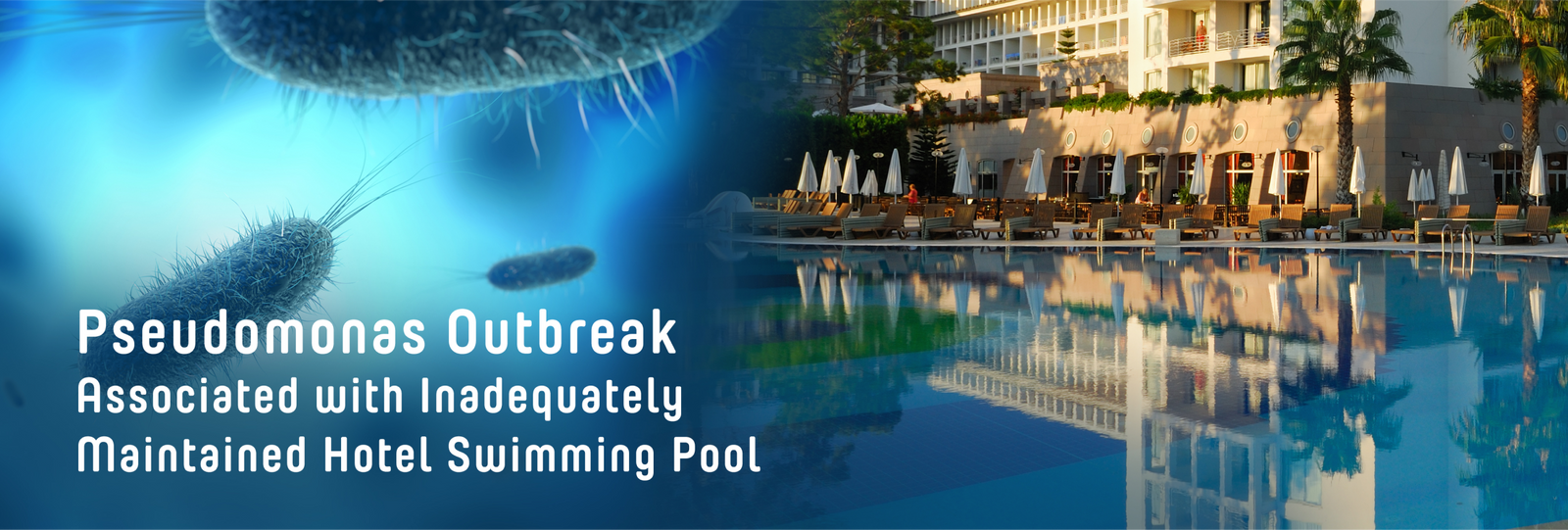
In early March 2023, the Maine Center for Disease Control and Prevention (Maine CDC) identified and investigated an outbreak of Pseudomonas aeruginosa infections among guests who used a swimming pool at a hotel in Maine. This outbreak highlighted critical issues regarding maintenance and disinfection of recreational water facilities, particularly in hotel settings where such venues represent one-third of reported treated recreational water-associated outbreaks nationwide.
Initial Reports and Investigation Launch
On March 7, 2023, Maine CDC received the first report from a group of hotel guests who had developed ear pain, rashes, and eye irritation after using the swimming pool at "hotel A" during the March 4-5 weekend. Throughout that day and the following, additional families reported similar symptoms, including redness and pain of hands and feet. Hotel management voluntarily closed the pool after receiving these complaints.
Maine CDC promptly initiated a comprehensive investigation on March 8, encompassing epidemiological, laboratory, and environmental health components to determine the source and scope of the outbreak.
Case Identification and Epidemiological Investigation
Investigators first interviewed representatives from six identified households with affected members. These interviews led to the identification of additional exposed individuals. Maine CDC also obtained a list of all registered guests present at the hotel during March 1-7 and contacted those potentially present during the exposure period.
In total, 15 interviews or questionnaires were completed, providing information on 35 unique individuals. A case was defined as the occurrence of ear pain, rash, or pain/swelling in feet or hands within 7 days after using the hotel pool during March 4-5.
Clinical Findings
Laboratory Analysis
Skin lesion swabs were collected from three patients and all tested positive for P. aeruginosa. Two of these isolates, obtained from family members who lived in separate households but spent time together outside the hotel, underwent whole genome sequencing. Single nucleotide polymorphism (SNP) analysis revealed the isolates were highly related with only a two-SNP difference, strongly suggesting infection from a common exposure source.
Environmental Health Investigation
The investigation uncovered a troubling history of non-compliance at the hotel pool. During a January 2022 routine inspection, multiple violations had been identified:
- No operator with approved training
- No pool logs documenting free chlorine concentration readings
- No posted routine operating procedures
When inspected on March 8, 2023, following the outbreak, only one of these violations had been addressed—an operator had completed approved training less than two weeks prior to the inspection. The other violations remained uncorrected more than a year after the initial failed inspection.
Pool logs for March 1-5 showed only two compliant free chlorine concentration readings (both on March 3), rather than the expected 15 readings required over that five-day period. The inspector noted that hotel staff had added an undetermined amount of chlorine to the pool after voluntarily closing it, making environmental sampling unproductive.
Maine CDC's Health Inspection Program directed hotel A not to reopen the pool until all violations were addressed.
Discussion and Context
P. aeruginosa is a chlorine-susceptible bacterium that can cause acute otitis externa (swimmer's ear), folliculitis (hot tub rash), and painful nodular lesions on soles or palms (hot hand-foot syndrome). These infections typically occur through contact with contaminated water, not person-to-person transmission.
The absence of a functioning disinfectant feeder system and inadequate monitoring of chlorine levels created conditions conducive to pathogen growth. Without maintaining the minimum recommended free chlorine concentration of 1 ppm, P. aeruginosa can proliferate and create biofilms—protective polysaccharide matrices that shield bacteria from disinfectants and are difficult to remove.
This outbreak exemplifies a broader pattern in recreational water-associated illnesses. CDC data shows:
- Among 987 treated recreational water-associated outbreaks, 369 (37.4%) were linked to hotel settings
- 222 outbreaks were confirmed or suspected to be caused by P. aeruginosa
- Of these, 152 (68%) were associated with hotel settings
- 66% of P. aeruginosa outbreaks in hotels began during January-April
- Weekend exposures are common, when trained operators might not be on duty
Prevention Recommendations
To prevent similar outbreaks, public health officials recommend
- Adoption of CDC's Model Aquatic Health Code recommendations
- Ensuring pools have operators with approved training
- Conducting daily pre-opening inspections for biofilm
- Maintaining adequate disinfectant levels (minimum 1 ppm free chlorine)
- Regular monitoring and documentation of water quality parameters
- Prompt addressing of identified violations
Pool users can protect themselves by checking the latest inspection scores before use and conducting their own assessment of water conditions using commercially available test strips.
This outbreak investigation demonstrates how inadequately maintained recreational water facilities can quickly become sources of infection. The combination of previously identified but uncorrected violations, inadequate disinfection practices, and insufficient monitoring created ideal conditions for a P. aeruginosa outbreak. The case underscores the critical importance of proper pool maintenance, adherence to public health codes, and vigilant oversight by trained operators to protect public health.

About WaterGuru
WaterGuru is a Silicon Valley company dedicated to protecting swimmer health in residential and commercial pools/spas. Its SENSE pool-health management solution combines state-of-the-art maintenance technologies with AI to help property management eliminate asset downtime, mitigate legal exposure, and improve guest experience. Through its LivePool API, WaterGuru integrates with leading pool service and property management platforms.

Subscribe to WaterGuru’s Pool-AI newsletter
for news on smarter pool management.
